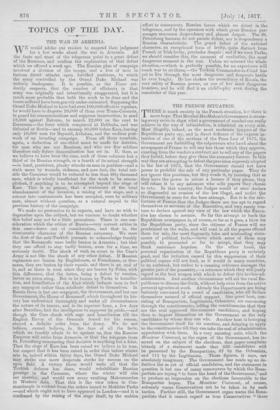TOPICS OF THE DAY.
THE WAR IN ARMENIA.
WE would advise our readers to suspend their judgment for a few weeks about the war in Armenia. All the facts and most of the telegrams point to a great defeat of the Russians, and confirm the explanation of that defeat which we offered a week ago. The Russian plan of campaign involved a division of the troops, and a loss of men in furious direct attacks upon fortified positions, to which the army controlled by the Grand Duke Michael was entirely inadequate. It is possible, as the Times evi- dently suspects, that the number of efficients in that army was originally and intentionally exaggerated, but it is much more probable that both the work to be done and the losses suffered have been gravely under-estimated. Supposing the Grand Duke Michael to have had even 100,000 effective regulars, lie would have to disperse 20,000 of them over Trans-Caucasia, to guard his communications and suppress insurrection, to send 18,000 against Batoum, to march 22,000 on the road to Erzeroum—the force which conquered at Delibaba, and was defeated at Sewin—and to encamp 30,000 before Kars, leaving only 10,000 men for 13ayazicl, Ardahan, and the endless post- work of an invading campaign. From all these numbers, again, a deduction of one-third must be made for Asiatics, for men who are not Russians, and who are fine soldiers therefore only before demoralisation has set in. If, then, as we believe to have been the case, each of these columns lost a third of its Russian strength, or a fourth of its actual strength —in hard, persistent, plucky attacks on men in position—and a sixth more by Wounds, sickness, and sore feet, the total out- side the Caucasus would be reduced to less than fifty thousand men, which is wholly insufficient for the work to be accom- plished, if anything is to be attempted beyond the siege of Kars. This is so patent, that a statement of the total abandonment of the invasion, a raising of the siege, and a retreat into cantonments has been accepted, even by military men, almost without question, as a natural sequel to the previous history of the campaign.
We make no pretension to be experts, and have no wish to dogmatise upon the subject, but we venture to doubt whether this belief may not be a little premature. There is one con- sideration which the critics of Russia—very correct critics in this case—leave out of consideration, and that is, the stratoeratie character of the Russian autocracy. We were the first of the anti-Turkish journals to acknowledge frankly that the Romanoffs were badly beaten in Armenia ; but that they can afford to stay badly beaten, even for a time, we seriously doubt. The shock of such an event to the Czar's Army is not like the shock of any other defeat. If Russian regiments are beaten by Englishmen, or Frenchmen, or Ger- mans, they are beaten by their equals, and there is an end of it, and so there is even when they are beaten by Poles, with this difference, that the latter, being a defeat by cousins, leaves an extra sting But to be beaten by Turks is humilia- tion, and humiliation of the kind which induces men to find any scapegoat rather than attribute defeat to themselves. In Russia there is but one scapegoat, the Government, and but one Government, the House of Romanoff, which throughout its his- tory has understood thoroughly and under all circumstances the nature of its tenure, and in its supreme hour, a few days after Borodino, had the intelligence to suppress its pride,—and though the Czar shook with rage and humiliation till the English Envoy of the Generals feared for his reason, obeyed a definite order from the Army. We do not believe, cannot believe, in the face of all the facts, which we frankly admit to be against us, that the Russian Emperor will retire from Armenia, or that the telegram from St. Petersburg announcing that decision is anything but a feint. That the siege of Kars has been raised we believe to be true, but suspect that it has been raised in order that before winter sets in, indeed within thirty days, the Grand Duke Michael may strike one more desperate stroke for success on the open field. A victory there would undo all that the Turkish defence has done, would rehabilitate Russian prestige in the Caucasus, where the winter will else see anarchy, and would cow every exulting Ildahommedan in Western Asia, That this is the view taken in Con- stantinople is evident from the orders issued to Mukhtar Pasha —and which ought not to have appeared in London—and it is confirmed by the raising of the siege itself, by the sudden • effort to concentrate Russian forces which we detect in the telegrams, and by the openness with which great Russian per- sonages announce despondency and almost despair. The St. Petersburg bureaus do not parade defeat, nor is despondency a Russian characteristic. The grand defect of the national character, an exceptional form of levity, quite distinct from French or Irish levity, precludes despair ; and if we were Turks, we should consider this, the moment of exultation, the most dangerous moment in the war. Unless we misread the whole situation,—which is perfectly possible, for no experience will teach war to civilians,—the Turkish Commander-in-Chief has yet to live through the most dangerous and desperate battle he ever fought. He has shaken the ascendancy of Russia, the very safety of Russian power, on one of her most dangerous frontiers, and he will find it no child's-play even during the remainder of this year.


































 Previous page
Previous page